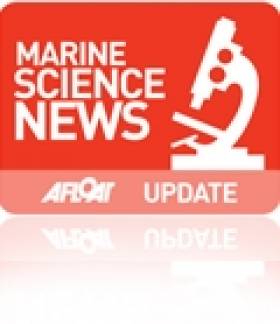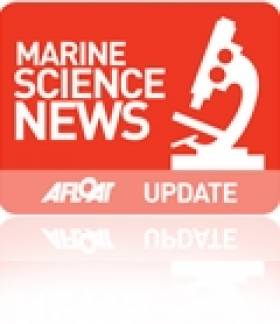Displaying items by tag: The Longest River
#MarineScience - A collaborative performance fusing arts, music and science has been shortlisted for the 2013 Allianz Business to Arts Awards.
As previously reported on Afloat.ie, The Longest River is a unique audio-visual performance intended to communicate the importance of marine science and research, putting a selection of choral music and traditional Irish music to a slideshow depicting marine scenes and video footage of the deep sea environment.
The production, a collaboration between the Marine Institute and Galway-based choir Cois Cladaigh, enjoyed a successful showcase earlier this year in Brussels, where it was also presented to primary school pupils.
“It is a great achievement to be shortlisted for this award as showcasing marine science, research and development through ocean literacy and music has proven to be an innovative way to engage new audiences," said Marine Institute chief Dr Peter Heffernan.
"This is especially important in developing a better understanding of the oceans and showing how this resource is key to generating social, cultural and economic benefits nationally and internationally."
The winners of the 2013 Allianz Business to Arts Awards will be announced on 10 September at the Bord Gáis Energy Theatre.
'Longest River' Hailed A Success In Brussels
#MarineScience - A unique audio-visual performance intended to communicate the importance of marine science and research has been praised at a showcase event in Brussels.
The Marine Institute has collaborated with Galway-based choir Cois Cladaigh on The Longest River, in which a selection of Latin and English choral music and traditional Irish pieces from the 9th century onwards are put to a photo slideshow depicting marine scenes and species, and video footage of extreme environment under the deep ocean.
According to the Marine Institute: "The unique collaboration has created an innovative means of engaging new audiences and raising the awareness of the science of our oceans and the importance of the deep seas that support our life on earth."
As previously reported on Afloat.ie, EU Fisheries Commissioner Maria Damanaki - a co-patron of the initiative - said The Longest River "demonstrates the importance of international collaborations on ocean research".
The marine science literacy and communication event, described as "an arts, music and science fusion", was presented to an audience of over 200 people as part of the celebration of Ireland’s Presidency of the Council of European Union at Eglise du Saint – Sacrement in Brussels.
The Longest River was also presented to over 100 primary school pupils at the Ecole Europeenne de Brussels IV in the Belgian capital. The children were introduced to Irish musicians Eugene Lambe and Kathleen Loughnane who spoke about the history of their instruments and played the Uillean pipe and Irish harp.
Dr Brendan O’Connor, director of Cois Cladaigh, also taught the pupils how to perform the Rondes by Folke Rabe, a contemporary performance extending the expression of vocal sounds that cannot be found in any language, yet are possible sounds inspired from deep within the ocean.
Supporting the Marine Institute and the development of The Longest River, Dr O’Connor said: “This event has enabled Cois Cladaigh to raise its profile amongst a wider audience as well as contribute to the ethos of evoking innovative arts and science literacy, offering better communication to a broad societal audience."































































